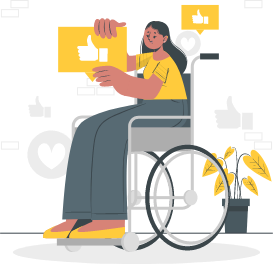
ASL Interpreters
Deaf rights are civil rights. Communication and connection are fundamental rights that should never be denied. Sadly, even more than 30 years after the passage of the ADA, frustrating barriers to communication persist. The specific rights and remedies available vary by context and based on individual needs and preferences.
Frequently, there is confusion by English speakers about the differences between English and ASL, or a -failure to understand accommodation is not a one-size-fits-all approach. Just as glasses may aid one person and another may rely on a guide dog, some people may be happy to communicate using CART while others require ASL interpreters. While it would be immediately and apparently ridiculous to hand a random prosthetic limb to a wheelchair user, the same types of errors frequently occur in providing accommodations to Deaf and hard of hearing individuals. Please do not fall into or accept the mentality that just any accommodation at all will satisfy the requirements of the ADA. Communication must be effective.
If you feel you have been discriminated against because you are Deaf or hard of hearing, please provide your contact information below and we will contact you to provide a brief confidential consultation at no cost.On This Page
The law protects people who use sign language (ASL) or otherwise rely on sign language interpreters to communicate. It is against the law for hospitals, doctors, movie theaters, and many other places to require people who use interpreters to bring their own. When communication is not clear, it can be frustrating or even dangerous. The law requires communication to be provided by the hospitals, doctors, movie theaters, and so on.



 Free Consultation
Free Consultation info@undauntedlaw.com
info@undauntedlaw.com +1 844-ADA-IDEA
+1 844-ADA-IDEA